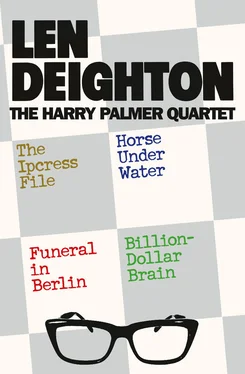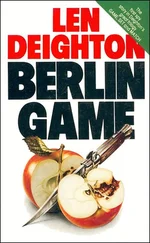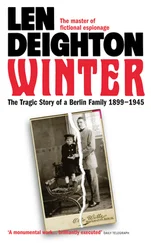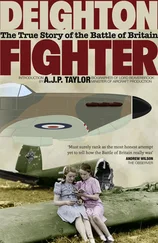‘Yes, sir, fairly well. They all have their peculiarities. Quite a few of the houses have front rooms where the curtains are never pulled back or changed, but that’s the English front room, isn’t it, sir?’
‘The sort of house I’d be interested in is one where new tenants have moved in during the last six months. A house where new people have been seen going in and out. People not of the neighbourhood, that is. Is there a house that is particularly secluded? It would have a garage and the driver might be able to enter the house direct from the garage.’
Viney said, ‘All the houses there stand back from the street, but one in particular is secluded because the owner has bought the undeveloped site on each side of the house. Of course, the houses either side of it are also secluded, but only on one side. Number 40 is one side, that’s all flats – young married couples mostly. Mrs Grant owns that. On the other side 44 is a very low building; the husband there is a waiter in the West End. I see him about two to two-thirty on the night beat. I know that Mr Edwards at the Car Mart made an offer for one of the sites. We kept pinching him for obstruction. He left his cars in the road. After we’d had him every day nearly for about a week, he came up to see the sergeant. I think really he told us about buying the site to show he was trying. But anyway, they wouldn’t sell. When I think of it, that’s the only house that I can’t remember any of the occupiers from. They had a lot of building done. Conversion into flats I imagine. About February. But there are no “to let” signs up. Not that you need ’em, word of mouth is enough.’
‘You’ve hit it, constable. I’ll buy your big secluded house with alterations.’
Keightley had phoned up the station and got them all in a rare state when he heard what had happened. Murray had heard Keightley’s high-pitched little voice saying, ‘Murder? Murder? Murder in a police station?’ Coming as Keightley’s voice did from CRO it worried them far more than anything I might say.
I had them do all the unit checks for fingerprints and Identikit descriptions of the two men – but knowing Jay’s set-up it was unlikely they would have a record of any sort, or leave prints. The constable recognizing Housemartin from a photo he’d seen once at CRO 1 was the sort of fluke that happens only very rarely. I turned to PC Viney who had brought me a cup of tea from the canteen. He stood, his uniform jacket undone, waiting and appraising my next action. I said to him, ‘Show me on the map, would you? And then I will want to use a phone in private – a scrambled line if possible.’
The information room at Scotland Yard came through in seconds. ‘Shoreditch Police Station. I want to speak with an officer of 3H Security Clearance or above; my authority is WOOC(P).’
‘Hold the line, sir.’
The unshaded light made bright reflections in the shiny-cream paintwork. Faintly through the closed door I could hear the canteen radio singing ‘There’s a Small Hotel’. My tea sat on the worn desk and I fiddled nervously with an old shell case made into a pen-and-ink stand. Finally the phone made clicking sounds and the information room came back on the line.
‘Chief Inspector Banbury, CID here.’
Luckily I knew ‘Cuff-links’ Banbury from the old days. It saved a lot of preliminary checking with code words. Or rather it would have done, except that ‘Cuff-links’ insisted on going through it all. I wanted thirty officers, at least five of them armed, and four vehicles without police identification.
‘All the plain-finish vehicles are in the Richmond garage,’ Cuff-links said.
‘Then borrow private cars from your coppers. Try West End Central, they’ve got big cars there.’ My sarcasm was lost on Cuff-links; he just carried on being smooth and efficient. ‘I want one car to have radio link. I shall be briefing them en route. Include a couple of hook ladders and a jemmy. Tell your press office that I want “complete blackout”, and put someone on the radio link that won’t shoot his mouth. That’s all, chief. Phone me back when they are on the road – say thirty minutes.’
‘No, about an hour.’
‘No good, chief, this is a 3H Security. If you can’t do better than that I’ll get authority to use my soldiers.’
‘Well, I’ll try for forty minutes.’
‘Thanks, chief. See you.’ It was 7.58.
I went upstairs. Murray was leaning over a big scrubbed table with the elderly constable, a sergeant and an inspector with a neatly trimmed moustache. I asked the sergeant who the inspector was. It didn’t make any of them madly happy, but ‘twice bitten could get to be a habit’. Murray had worked out a sensible way of hitting 42 Acacia Drive. He had dug out a photo of the street and had drawn a diagram showing heights of garden walls and deploying twenty-five men. Murray had also implied by unknown subtle means that his rank was considerably higher than sergeant. The inspector was deferring to his suggestions and the police sergeant was saying, ‘Yes sir, good sir, very good, sir.’ I told the policemen that they could come along if they wished, but explained that since I had put ‘complete blackout’ on the operation, any leakage would be actionable under the Official Secrets Act.
Murray used a propelling pencil with changeable coloured leads to mark in the extra five men; then we stood around drinking another cup of sweet tea. By now the canteen was organized for the top brass. I had a swallow-pattern cup with a saucer to match and a spoon. Murray decided that this was a good time to ask about his living-out allowance. It was nearly three months behind. I said I’d do what I could.
At 8.21, after a knock at the door, a constable said a military police vehicle had just driven into the courtyard, the driver asking for ‘Mr’ Murray. Murray said he thought a Champ vehicle with radio equipment ‘might be useful’. He’d asked for it to drive in instead of parking conspicuously. Murray and I went downstairs to see if the radio could get the Scotland Yard wavelength. He told me that by having a Provost vehicle we automatically got a revolver and ammunition and what he described as ‘other useful things’. Murray was proving so unlike what I imagined that I decided to recheck his security clearance the next day.
1 Criminal Records Office.
Acacia Drive was a wide wet street in one of those districts where the suburbs creep stealthily in towards Central London. The soot-caked hedges loomed almost as high as the puny trees encased in their iron cages. Here and there a dirty net curtain let a glimmer from a 40-watt bulb escape to join the feeble street lighting.
We waited while the last two men got into position. A door opened somewhere down the street, firing a yellow shaft of light into the gloom. A man in a cloth cap pulled a silver fabric cover from a shrouded car. It proved to be not the one he was looking for. He lifted the silver skirt of the next car. The third one had the right number plate. He drove it off down the street which now became a dark and silent car mortuary once more.
No. 42 had two gates joined by a semicircular driveway of crunchy gravel. On the top floor one very small window showed a light. The Champ vehicle was nearer to the house than any of the private cars the police had used. In the back seat the military policeman was listening to the radio sets of the plainclothes men positioning themselves in the back garden. He gave us the high sign with thumb touching forefinger. Murray and I decided to force a window at the side of the house. The MP was to talk out a description of signals we gave him by torch. Murray had the jemmy and I had a sheet of brown paper covered with police canteen golden syrup.
Читать дальше












